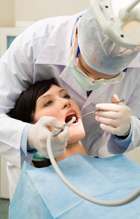 Having a tooth extraction is a pretty unpleasant experience in itself and you no doubt would expect some discomfort for a few days afterwards, but if the pain doesn’t go away, and even begins to get worse, you might be suffering from another condition called dry socket.
Having a tooth extraction is a pretty unpleasant experience in itself and you no doubt would expect some discomfort for a few days afterwards, but if the pain doesn’t go away, and even begins to get worse, you might be suffering from another condition called dry socket.
Dry socket happens in a very small percentage of cases, usually about 2 to 5 pr cent, but for those unlucky few it is a very unpleasant experience. Luckily, dry socket is easily treatable.
Dry socket occurs when the blood clot that fills the hole after a dental extraction becomes dislodged. This leaves the nerve exposed to air, fluid and food and can lead to severe pain. There are certain conditions that make people more prone to dry socket than others. Patients who smoke are at higher risk, as a re patients with poor oral hygiene. Other factors include what kind of extraction it is, patients on birth control medication and a history of dry socket.
If you are suffering from dry socket you will most likely be able to see bone at the bottom of the socket. You will also be experiencing quite severe pain that is spreading to the ear. An unpleasant smell and taste in your mouth are also symptoms of the condition. You can get some relief from dry socket with over-the-counter pain relief but you will need to see a Central Leeds dentist as soon as possible. The dentist will be able to clean the socket and aid healing with gauze. They can also prescribe antibiotics to prevent the spread of any infection. The healing process can take up to two weeks.





 Dry socket, often referred to as alveolar osteitis, is a common complication associated with tooth extraction. It occurs when the blood clot that fills the socket after extraction is removed either because it dislodges or disintegrates. The blood clot is important in aiding the healing process and if it disappears it exposes the bony socket and delays the healing.
Dry socket, often referred to as alveolar osteitis, is a common complication associated with tooth extraction. It occurs when the blood clot that fills the socket after extraction is removed either because it dislodges or disintegrates. The blood clot is important in aiding the healing process and if it disappears it exposes the bony socket and delays the healing.

